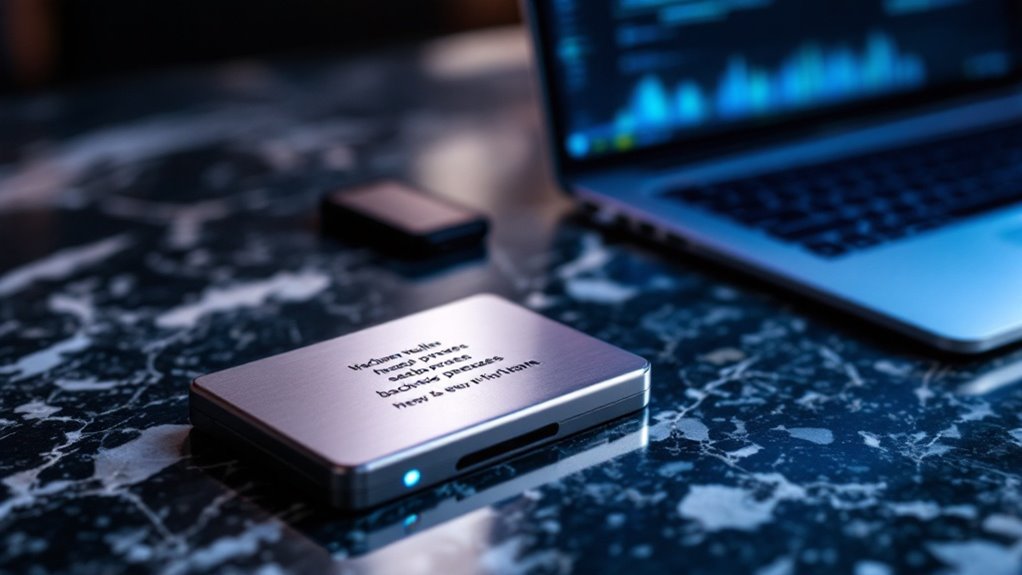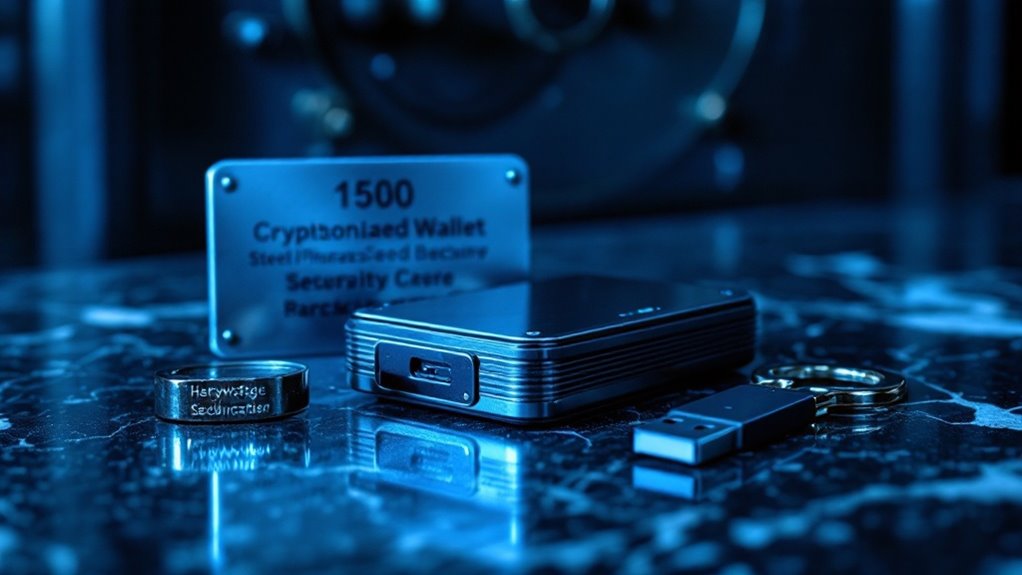Securing cryptocurrency requires layered defenses, much like protecting a digital fortress. Essential practices include using complex 16+ character passwords, implementing two-factor authentication, and keeping private keys strictly confidential. Hardware wallets provide vault-like protection, while regular security audits maintain system integrity. Smart crypto owners balance convenient "hot wallets" for daily use with ultra-secure "cold storage" for larger holdings. The path to truly mastering crypto security reveals ever-deeper protective measures.

The digital frontier of cryptocurrency beckons with promises of financial freedom, yet this new domain demands vigilant protection at every turn. Like a fortress guarding precious treasures, crypto security begins with impenetrable authentication measures. Modern crypto users must wield complex passwords spanning at least 16 characters, while embracing two-factor authentication as their digital shield. Hardware security keys, standing like steadfast sentinels, offer far more protection than their SMS-based counterparts. Popular authenticator apps provide time-based codes for enhanced account protection.
In the domain of wallet management, users face a choice between the convenience of hot wallets and the fortress-like security of cold storage. Hardware wallets, such as Ledger or Trezor, act as digital vaults, while paper wallets serve as ancient scrolls preserving crypto wealth in offline sanctuaries. Multi-signature solutions add layers of protection, requiring multiple keyholders to approve transactions, much like a bank's dual-control system. The implementation of Zero-Knowledge Proofs enhances transaction privacy while maintaining security.
Private keys represent the crown jewels of cryptocurrency ownership, demanding protection worthy of their status. These digital signatures must never see the light of public exposure, instead finding refuge in encrypted backups and metal plates that resist nature's destructive forces. Each transaction becomes a careful dance of verification, with savvy users sending test amounts before larger transfers, like scouts preceding an army.
Guard your private keys like ancient treasure, for they alone hold the power to unlock your digital fortune.
The digital landscape teems with modern-day highway robbers in the form of phishing attempts and scams. Users must navigate this treacherous terrain with eagle-eyed attention to detail, scrutinizing URLs for subtle manipulations and treating unsolicited offers with healthy skepticism. Blockchain technology provides an additional layer of security through its decentralized nature, making unauthorized alterations virtually impossible. Security-conscious individuals maintain dedicated devices for crypto transactions, much like having a separate vault room for precious metals.
The symphony of crypto security orchestrates multiple instruments – from up-to-date software playing in harmony with encrypted devices, to the quiet rhythm of regular security audits. Success in this digital age requires a delicate balance of technological prowess and old-fashioned discretion.
Just as one wouldn't broadcast the contents of their safe, crypto holders maintain operational security through calculated silence and strategic planning, ensuring their digital wealth remains protected in this evolving financial frontier.
Frequently Asked Questions
How Do I Recover My Crypto if My Hardware Wallet Breaks?
When a hardware wallet breaks, the owner can recover their crypto by using their offline-stored recovery phrase to initialize a new hardware wallet or compatible software wallet, restoring access to their funds.
Can Exchanges Freeze or Block Access to My Cryptocurrency Assets?
Yes, centralized cryptocurrency exchanges can freeze or block access to user assets for various reasons including suspicious activity, regulatory compliance, or security concerns. Users should consider storing assets in private, non-custodial wallets.
What Happens to My Crypto Assets if I Pass Away?
Cryptocurrency assets become part of the deceased's estate, requiring proper documentation and private keys for beneficiaries to access. Without estate planning, assets may be permanently lost or face lengthy probate proceedings and tax implications.
Are Software Wallets Safe Enough for Storing Large Amounts?
Software wallets, while convenient, are not recommended for storing large cryptocurrency amounts. The combination of online vulnerabilities and potential security breaches makes hardware wallets or cold storage solutions more suitable for significant holdings.
How Often Should I Change My Wallet's Recovery Phrase?
Recovery phrases cannot be changed – they are permanently linked to wallet creation. Creating a new phrase would generate a different wallet entirely. Instead, users should focus on securely backing up their existing recovery phrase.









